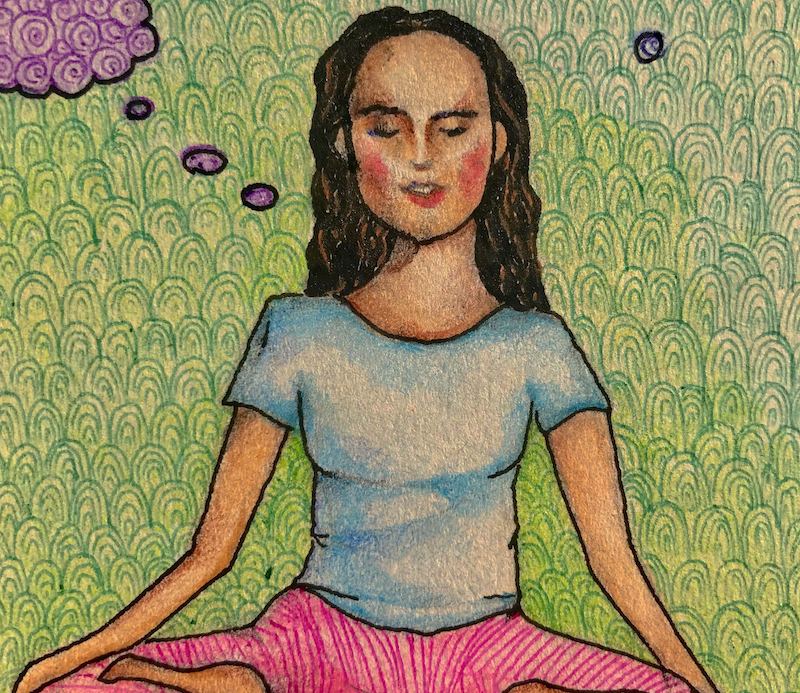Whenever I receive a push notification about new coronavirus cases in Ireland, anxiety hits and my nervous system reacts with an increased heartbeat and shallow breathing. This makes it hard to focus on studying. So when I read that Trinity researchers found that respiration and attention might be linked through the locus coeruleus (a tiny spot in the brainstem), and that pranayama (the practice of breath control) may positively impact both, I decided to test it out – one hour of meditation daily, for one week.
On day one, I’m sitting on my bed (cross-legged of course) readying myself for big revelations and a peaceful mind. Instead however, I spend an hour wondering what I might eat for breakfast, amounting to 3,600 seconds of lost time.
Looking for new motivation, I read a study that used functional magnetic resonance imaging (fMRI) and pupil dilation measures to analyse the “mechanism of synchronization between respiratory and attentional systems”.
Speaking with The University Times, Dr Ian Robertson, co-director of the Global Brain Health Institute, points out that research findings like these are often underused: “People don’t realise that they can control the chemistry of their own brain using their breathing.” Robertson explains that breathing can influence the carbon dioxide levels in your blood, which then affects the action of the chemical messengers in your brain.
Robertson admits however, that we all have our own breathing habits. This means that to benefit from breathing techniques when experiencing stress or anxiety, we need to practice them while we’re relaxed. “People with good attention seem to naturally, or have learned, to synchronise their responses to the breathing”, he elaborates, using the example of an archer trying to reach optimal performance.
Science isn’t the only discipline to endorse meditation and pranayama however. Dublin-based artist Patricia Fitzgerald utilises mandalas and mindfulness in her artwork, which is displayed in her Marlay Park studio and on her website, Healing Creations. Fitzgerald tells me that while meditation, mandalas and mindfulness exercises usually aim to quiet the chatter of your mind, a person can also go “deeper”. This might not always feel easy, she notes, warning: “You’re going into the shadow and you might look at things that you might not want to see.”
Her mandala tutorials could also be used on Zoom with a friend to create a more intimate connection, for instance, as we both agree that online conversations can often feel a little “empty”. In a time of mandatory masks, Fitzgerald believes that by creating mandalas, or engaging in other mindfulness exercises, “you’re stripping away the psychological masks that you’ve been putting on to those things that relate to who you are”.
On day five of my experiment, I decide to leave the window open in the hope that fresh air and the sounds of nature would deter me from falling asleep or rearranging my to-do list again. Instead of delighting nature sounds however, someone using a leaf blower accompanied at least half of my meditation, leaving me, quite frankly, not very relaxed.
Luckily, this was the day that I spoke to Annemarie Naughton, a mindfulness teacher from Trinity’s Counselling Services. She immediately eased my mind regarding my apparent “failure” and reminded me that compassion is an essential part of meditation. “If I was to have one message: don’t be hard on yourself”, she assured me. “If it doesn’t work or you said you’d meditate every day and you’ve only done it once, that’s okay. Try again.”
Naughton also informed me that having a busy mind isn’t just normal, it’s “the reality” of “what it means to be human”. “We have these wonderful brains […] that are thinking thoughts all the time”, she says, “particularly in this environment in Trinity where we use our minds all the time to study and to get stuff done.” The brain, however, can also “trip us up because our minds are so imaginative that we can imagine the worst”.
Describing how practicing mindfulness and meditation has enhanced her life over the past 15 years, Naughton says that meditation can be especially helpful for students dealing with the current uncertainty.
“Even two minutes is a start”, she suggests. “It’s just stopping and interrupting the autopilot, checking in: how am I right now?”
Finishing my last meditation on day seven, I realised that although I didn’t have any big revelations or even feel particularly calm, meditation taught me to be a little more compassionate towards myself.
During a busy week of settling back into something resembling a routine, I felt a little more grounded and centred. Yes, it was incredibly challenging, but these tiny changes can make a huge emotional difference to our lives. So, try it, for just one week or one hour. How long can 3,600 seconds be anyways, right?
Drop-in mindfulness guided meditations are available on Tuesday evenings from 5pm to 5.30pm and on Wednesday lunchtimes from 1pm to 1.30pm. Further details can be found on the Student Counselling website.







